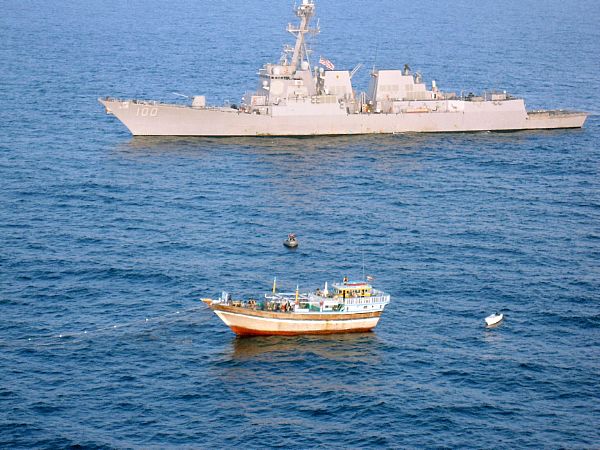Visit to Northwood OHQ, headquarters of Operation Atalanta
(B2) I was able with some French colleagues to visit - in preview - the operational headquarters (the OHQ) which will be used for the operation to fight against piracy (Eunavfor Atalanta).
Departure from Vélizy in the morning in an Air Force Casa 235 to land at the Northolt military base, a famous base during the 2nd World War and located not far from Northwood. Our welcoming English direct us immediately to... the "Polish house", reception room, dedicated to Polish airmen, whose portraits adorn the walls. Rightly so, it seems. These pilots distinguished themselves particularly during the 2nd World War: more experienced and more daring than their British colleagues, they had an impressive number of successes to their credit (German planes shot down. A Polish "spit(fire)" also sits the entrance to the base...

Located in Northwood, North London (and not at the edge of the sea as mentioned, romantically, some dispatches from the AFP…). The headquarters is above all a permanent building site. Red brick buildings. And especially cranes, tippers, concrete blocks and buildings under construction. Northwood is, indeed, not only the command of the Atalanta operation but especially the British operational command for the external operations (Iraq, Afghanistan…), thus the naval command of NATO. And judging by the rigorous checks at the entrance – with the dog passing through our ranks to sniff out the explosives – and the inquisitive looks on the way. Moreover, it is forbidden to walk alone, even to smoke a cigarette or go to the toilet. History that we would get lost. Silence reigns as journalists approach. It's normal. Everything is not quite settled. The operation plan is still under discussion on certain points. The legal points in particular. And above all, it is a question of not deflowering the subject: the official launch conference is scheduled for December 9 in Brussels.

The European flag in a British base is not common. The OHQ itself is a 3-storey building in front of which floats – it is rare enough to be reported – the European and British flags side by side -. Around 80 to 90 officers from around ten Member States work there, spread over different offices. A few haven't really had a long way to go. They worked in the buildings nearby, as liaison officers in NATO's maritime quarters.

The command room (we won't go through the door...at least not officially) is, in fact, quite simple: a few tables, some chairs, a few computers. On the wall, a large map of the Gulf of Aden displayed on the wall. Telephones and cables. Most of the work is done by telephone, internet or secure video-conferencing. So no lights flashing with boat positions in real time. And lots of cards. No need to bother, these are digitized...
In any case, the OHQ is not there to directly command the movements of the boats. Rather, he ensures the political (strategic) command of the operation, liaison with the main political authorities, European or international: in Brussels (with the political and security committee, with Javier Solana...), and in the capitals. It also gives instructions and authorizations for action in certain cases: arrest of pirates, transfer to a given country or ship, accompaniment of a ship that has requested it.

But at the tactical level, it is the Force Commander, the Greek Commodore Papaioannou, from his boat in the area, who defines which boat is authorized to intervene and with what means. In certain cases, he is empowered to intervene directly - in an emergency, for example. Similarly, a boat in the area that sees a boat being attacked not only has the possibility but the obligation to help itself as quickly as possible, by referring to its force commander (the latter transmits immediately).
The problem of "detention"... It may also be up to him to resolve the legal questions that are sure to arise. The arrest of the pirates is not a major problem but their 'detention' (and their possible bringing before a court) is " always a problem", explains John Hutton the British Minister of Defence. And to add "We cross our fingers so that there is no problem",... in suiting the action to the word...
(NGV)
